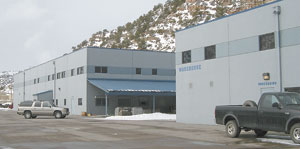Price consortium lands federal, state monies for Western Energy Training Center
Culminating two years’ dealings with the Department of Labor, a consortium of local business and education interests today announced the establishment of the Western Energy Training Center in Price. The efforts of the group, directed through the College of Eastern Utah and Southeast Energy Producers Association, have led to the purchase of the Willow Creek coal mine site in Helper as the main campus for programming focused on improving the labor supply and technical expertise needed by the energy industry.

Culminating two years’ dealings with the Department of Labor, a consortium of local business and education interests today announced the establishment of the Western Energy Training Center in Price. The efforts of the group, directed through the College of Eastern Utah and Southeast Energy Producers Association, have led to the purchase of the Willow Creek coal mine site in Helper as the main campus for programming focused on improving the labor supply and technical expertise needed by the energy industry.
“There is a labor shortage in the energy industry that is projected to only deepen as the current employee base moves into retirement and demand continues to grow,” noted Dr. Ryan Thomas, president of the College of Eastern Utah (CEU). “Our mission as an educational institution, coupled with the region’s history and future prospects for energy development of virtually every type, led us to pursue this opportunity. Our goal at the Center is to help create the good-paying, year-round energy jobs so badly needed throughout rural areas of the West,” he said.
Thomas said the Southeast Utah Energy Producers Association (SUEPA) was an early force in pursing the concept, noting that the initial Board of Directors for the Western Energy Training Center has strong SUEPA representation. “The public-private representation by the College and SUEPA was, I feel, critical to our ability to attract these start-up monies. SUEPA will assure that industry’s needs are foremost at the Center.” Thomas said that several sub-committees have been formed to begin work on curriculum, faculty and operations for the facility, with hopes of accepting the first applicants sometime mid-summer 2006, noting that several companies have already expressed interest in offerings at the Center.
In addition to the $2.75 million in Department of Labor funds, the group was also successful in garnering $1.1 million in State of Utah funds during Utah’s 2006 legislative session. The state funds went toward the purchase of the facility.
Western Energy Training
“The key ingredient that fell into place for us was Foundation Coal’s donation of what is essentially a turn-key facility,” said Steve Burge, interim director of the Center.
“Though we were fortunate to see the incredible responsiveness of our elected officials, the donation of three modern, working buildings of a combined 38,000 feet on 270 acres for literally pennies on the dollar of appraised value for Foundation Coal’s facility is the linchpin of the entire concept. We intend to make this a community asset for generations here.” Burge said initial course offerings currently being considered include skill certification, safety awareness and regulatory compliance, equipment operation and repair, emergency response and business and management. “We also intend to bring in specialists that can focus on the increasingly specialization required by emerging technologies,” he said. “The curriculum must be market driven if it’s to be relevant to industry.”
Officials point out that the Center will extend beyond the extraction industries to include renewable, transmission and delivery components to the energy industry.
“Energy independence for America will require us to develop every source at our disposal,” said Sam Quigley of SUEPA, who serves as President of the Board of Directors for the Center. “The role this center can make to that effort was instantly recognized by our federal representatives Senators Orrin Hatch and Robert Bennett and our Congressman Jim Matheson, all of whom helped us navigate the appropriate federal channels for support.” Quigley also cited State Sen. Mike Dmitrich, State Rep. Brad King and Patrick Painter and Carbon County Commissioners Bill Krompel, Mike Milovich and Steve Burge as advocates for the effort. “We were able to generate support at every level,” he said. “That sort of federal, state, local and bi-partisan support suggests to me that the potential of the Center is great and apparent.”




